
|
5 Modals of deduction - used to make guesses or deductions about past situations. 2
Students should learn modals of deduction because they are useful for expressing logical guesses or assumptions about past situations, helping speakers show how certain or uncertain they are. These modals, such as must have, might have, could have , and can�t have, make speech sound more natural and fluent, improve communication and reasoning ski...
Level: elementary
Age: 9-100
Type:
Downloads: 106
|
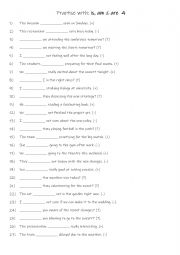
|
A1 Practise with is, am & are 4
Students read the sentence and complete the sentence with the correct form of the verb to be. They use the (+) or (-) sign at the end of the sentence to see if it needs a positive or negative form of the verb to be. Each form is used 3 times! Answers on page 2.
Level: elementary
Age: 6-100
Type:
Downloads: 111
|
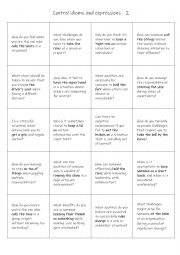
|
B1+-C1 In control idioms and expressions 2
This is a speaking reinforcement activity to supplement the other worksheet I uploaded earlier this year. Students working in pairs or small groups can either ask each other the questions or answer the question themselves.
Level: intermediate
Age: 12-100
Type:
Downloads: 121
|
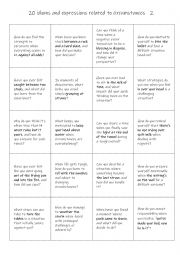
|
B1+-C1 Circumstance idioms and expressions 2
This is a speaking reinforcement activity to supplement the other worksheet I uploaded earlier this year. Students working in pairs or small groups can either ask each other the questions or answer the question themselves.
Level: intermediate
Age: 12-100
Type:
Downloads: 121
|
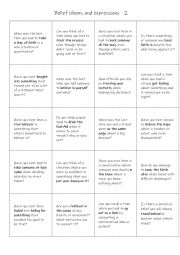
|
B1+-C1 Belief idioms and expressions 2
This is a speaking reinforcement activity to supplement the other worksheet I uploaded earlier this year. Students working in pairs or small groups can either ask each other the questions or answer the question themselves.
Level: intermediate
Age: 12-100
Type:
Downloads: 114
|
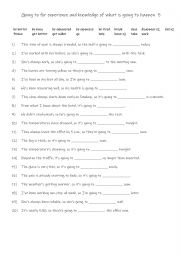
|
Going to for experience and knowledge of what is going to happen 5
First, students need to familiarise themselves with the verbs and their meanings. Then they read the sentences to see which one is required to complete the sentence. Answers on page 2.
Level: elementary
Age: 8-100
Type:
Downloads: 104
|
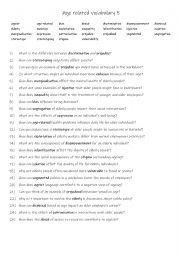
|
B1+-C1 Age related vocabulary 5
Learning age-related vocabulary equips students to recognise and discuss biases such as ageism, stereotyping, and discrimination, fostering greater awareness of the challenges faced by different age groups. Words like marginalisation, isolation, and vulnerability encourage empathy by highlighting the social and emotional impact of age-related inequ...
Level: intermediate
Age: 12-100
Type: worksheet
Downloads: 112
|
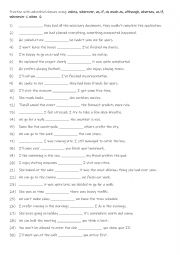
|
A2+-B1 10 Adverbial clauses 6
Learning adverbial clauses using words like unless, wherever, as, if, as much as, although, whereas, as if, whenever and when helps students express complex relationships between ideas, such as condition, time, contrast, and manner. First, students need to familiarise themselves with the 10 adverbial clauses and their use. Then they read the senten...
Level: elementary
Age: 9-100
Type:
Downloads: 118
|
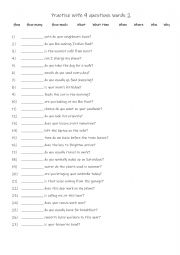
|
A1 Practise with 9 questions words 2
Students familiarise themselves with the 9 question words and their use. Then they read the questions to see which question word is required to complete the questions. Answers on page 2.
Level: elementary
Age: 7-100
Type:
Downloads: 111
|
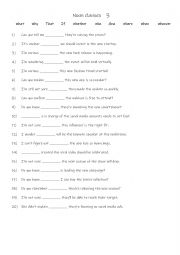
|
A1-A2 Noun clauses 3
Students complete the gap-fill with the correct word. Each word is used 2 times! Answers on page 2.
Level: elementary
Age: 7-100
Type:
Downloads: 126
|












